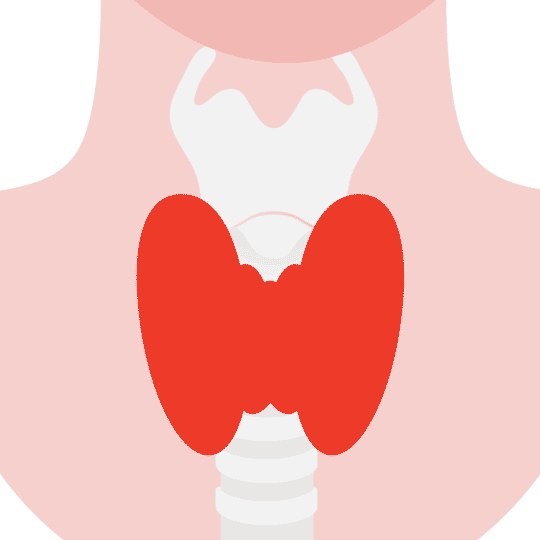
Published on Aug 21, 2023
Last modified on Apr 09, 2025
Is It Hypothyroidism Or Is It Menopause?
5 min read
Although not directly related to menopause, the thyroid hormone plays a key role in metabolism. If our bodies aren’t producing enough — aka hypothyroidism — we can experience fatigue, weight gain, dry skin, and thinning hair…which coincidentally are ALSO common perimenopausal/menopausal symptoms. Risk of hypothyroidism increases from 3% in your 40s to 10% by the time you turn 65.
So if you’re wondering…are my symptoms due to menopause? or something thyroid-related? or BOTH???…you’re not alone.
Here’s what you need to know.
Thyroid 101
The thyroid is an endocrine gland in our necks that’s shaped almost like a butterfly. When the pituitary gland secretes thyroid-stimulating hormone (TSH), it triggers the thyroid gland to produce two key hormones that impact our metabolism (aka the speed with which our body works):
- Thyroid-stimulating hormone (TSH)
- Free thyroxine (FT4)
Together, these hormones impact our heartbeat, energy levels/feelings, digestive system, and body temperature.
What happens when there’s not enough thyroid hormone produced
This is what’s called hypothyroidism or “underactive thyroid,” and it usually falls into one of three categories: primary, secondary, or tertiary.
- Primary hypothyroidism: when the thyroid gland has a decreased ability to release FT4 and FT3 or respond to TSH
- Secondary hypothyroidism: when the pituitary gland doesn’t produce thyroid stimulating hormone (TSH) or the hypothalamus doesn’t produce enough thyroid-releasing hormone (TRH), which causes the thyroid gland to produce less T3 and T4
- Tertiary hypothyroidism: when the hypothalamus doesn’t produce enough thyrotropin-releasing hormone (TRH), so the pituitary gland doesn’t produce enough TSH to stimulate thyroid hormone production
Common causes of hypothyroidism:
- Autoimmune conditions (e.g., Hashimoto’s)
- Hereditary conditions (e.g., chronic lymphocytic thyroiditis)
- Iodine deficiency/excess or thyroid radioactive iodine therapy
- Thyroid surgery
- Some medications (e.g., amiodarone, phenytoin, carbamazepine)
Additional causes of secondary or tertiary hypothyroidism may include pituitary tumors, tumors compressing the hypothalamus, brain radiation therapy, or Sheehan syndrome (postpartum pituitary necrosis).
The most common treatment is levothyroxine, a daily hormone tablet that replaces the thyroxine hormone that the thyroid is not making enough of.
What happens when there’s TOO much thyroid hormone produced
This is what’s called hyperthyroidism or “overactive thyroid.” The most common cause is Graves disease, with additional contributing factors including:
- Inflammation due to viral infections, certain medications, or pregnancy
- Taking too much thyroid hormone
- In rare cases: noncancerous growths on the thyroid or pituitary gland, consuming too much iodine-rich foods
Treatment of hyperthyroidism depends on the cause and may include radioactive iodine and antithyroid medications (e.g., propylthiouracil or methimazole).
Is there a connection between menopause and thyroid disorders?
There is — and it all comes down to hormone levels.
Here’s the long and the short of it: the menopause transition is associated with three key hormones: estrogen, progesterone, and testosterone.
As we approach perimenopause, our progesterone drops while estrogen begins to fluctuate, then also drop. The result? Periods may become shorter or longer, heavier or lighter, and irregular…in short, they’re totally unpredictable and out of whack.
How declining progesterone impacts thyroid function
Lower progesterone levels are also associated with lower thyroid hormone levels. This is why, when women with hypothyroidism are treated with progesterone, their thyroid function improves.
Getting into the nitty-gritty:
- Progesterone deficiency causes a decrease in thyroid peroxidase (TPO), an enzyme that’s used to make FT3 and FT4 hormones, which then results in hypothyroidism.
- Progesterone deficiency also causes an increase in thyroid-binding globulins (TBG), which then lowers the amount of thyroid hormone available in the body, contributing to hypothyroidism.
How fluctuating estrogen impacts thyroid function
By lowering our active thyroid levels
Because the thyroid gland has estrogen receptors, increasing estrogen levels can also raise the levels of thyroid binding globulins (TBG). TBG, in turn, binds to and lowers the thyroid hormone, decreasing the amount available to the body.
Keep in mind that the thyroid gland itself may be “normal,” but because increased estrogen lowers our active thyroid levels, it results in symptoms of hypothyroidism such as tiredness, brain fog, hair loss, weight gain, lower libido, mood swings, constipation, and irregular menstrual cycles.
By putting us at increased risk for Hashimoto’s
Fluctuating estrogen levels during the menopause journey may increase inflammation which, in turn, leads to an increased risk of developing autoimmune diseases such as Hashimoto’s thyroiditis, which is one of the main causes of primary hypothyroidism.
By worsening hypothyroidism
Estrogen is broken down by the liver before being excreted from the body. Hypothyroidism slows down this process, resulting in what’s called estrogen “dominance” (meaning increased estrogen levels relative to progesterone). This worsens hypothyroidism and puts us at increased risk of breast cancer, uterine fibroids, and ovarian cysts.
IMPORTANT: Women on thyroid replacement and oral estrogens, should monitor their thyroid stimulating hormone and have their thyroid dosing adjusted as needed.
How do I know if something is a symptom of menopause or a thyroid problem?
Let’s break it down.
These are the most common symptoms of menopause:
- Hot flashes & night sweats
- Bloating
- Brain fog
- Brittle nails
- Joint pain & osteoporosis
- Decreased libido
- Dizziness
- Mood changes (anxiety & depression)
- Dry, itchy skin (including vaginal dryness)
- Fatigue
- Hair loss
- Heart palpitations
- Irregular periods
- Difficulty sleeping
- Weight changes
Symptoms of thyroid disorders will vary based on whether it’s underactive thyroid (aka “low thyroid”) or overactive thyroid.
- Symptoms of hypothyroidism: fatigue, brain fog/forgetfulness, mood changes, weight gain, irregular periods (heavier, more painful, more frequent), cold intolerance, constipation
- Symptoms of hyperthyroidism: hot flashes, heart palpitations, sleep problems, weight loss, irregular periods (shorter, lighter), heat intolerance, frequent bowel movements
Note that untreated severe hyperthyroidism may increase our risk of low bone density or osteoporosis as well.
While there are definitely overlapping symptoms, some are unique to hypothyroidism, including neuropathy (aka numbness/tingling in the hands and feet), hoarse voice, swelling around the eyes, or skin changes such as myxedema.
How do I know if I have a thyroid problem?
Blood test
Your healthcare provider (in this case, endocrinologist) can administer a simple blood test to rule out thyroid disease/dysfunction. Called thyroid function test (or TFT, for short), the panel measures TSH levels, as well as Free T4 and Free T3 levels.
Routine physical
During your annual physical, your provider can examine the thyroid by feeling for lumps (nodules) and/or an enlarged gland (goiter), both of which may be signs of a thyroid condition.


